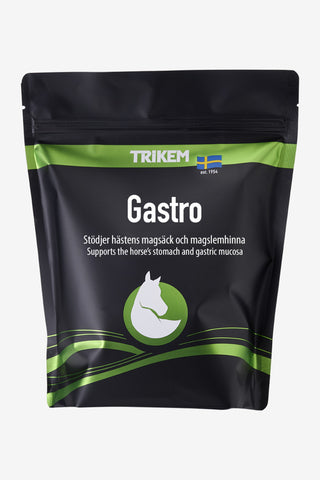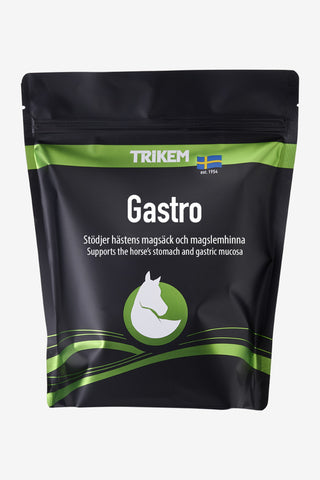Gastro is a supplement designed to protect the horse's stomach and its sensitive mucous membranes. Gastro contains lecithin, a substance naturally present in horses, which together with polysaccharides forms a barrier gel in the stomach to effectively protect the mucous membranes from stomach acid. Gastro acts as a stomach balm for horses with or suspected of having gastric ulcer issues.
Gastro contains the barrier-forming and naturally occurring substance lecithin, which protects the sensitive stomach from acidic gastric acid. Like a stomach balm for the sensitive individual!
How does it work?
Lecithin is a natural substance found in the horse's stomach. When lecithin comes into contact with stomach acid, it breaks down into phospholipids. Phospholipids are a group of fats found in the cell membrane of the cells that protect and repair the mucous membrane in the horse's stomach.
Stomach acid
Horses have a continuous supply of stomach acid, regardless of whether they are eating or not. The stomach acid is strong and, if there is not enough feed in the stomach, can damage the sensitive mucous membrane.
No horse is the same as another, and there are also individuals who tend to suffer from gastric ulcers even though they receive a fiber-rich diet and their feed is divided into several portions.
When is Gastro recommended?
Gastro can be given as a daily supplement or during limited periods. Many horses are affected by travel or competition, so it is beneficial to provide Gastro to the horse in these situations.
Pelleted form.
0h competition withdrawal period
Gastro is recommended for:
- Horses with sensitive stomachs.
- Horses with previous stomach problems during stressful periods, e.g. environmental changes and travel. In connection with medication that affects the stomach and intestines.
Dosage:
15 ml (10 g) per 100 kg body weight per day. For the first 10 days, a double dose is recommended, then according to the daily recommendation. Mix dry with other feed just before feeding (should not be soaked).
| Weight |
First 10 days |
Daily dose |
| Horse 500 kg | 150 ml/day | 75 ml/day |
| Pony 250 kg | 80 ml/day | 40 ml/day |
If gastric ulcer is suspected, a veterinarian should be contacted.
Storage & shelf life
Store dry, cool, and well-sealed. See best before date.
![]() Recycle as plastic.
Recycle as plastic.
| Additives | per 75 ml (50 g) | per kg |
| Stabilizing agent | ||
| Guar gum E412 | 20 g | 400 g |
| Emulsifier | ||
| Lecithin 1c322 | 20 g | 400 g |
| Anti-caking agent | ||
| Diatomaceous earth E551c | 2.5 g | 50 g |
| Composition | ||
| Dried wheat distillers grains |
| Analytical constituents | |
| Crude protein | 4.0 % |
| Crude fat | 36.4 % |
| Crude fiber | 0.8 % |
| Crude ash | 18.6 % |
| Calcium | 22 g/kg |
| Sodium | 40 g/kg |
| Phosphorus | 20 g/kg |
Recommended by veterinarians.
"Gastro works wonders for my sensitive horse's stomach!" -
Gastro is a supplement designed to protect the horse's stomach and its sensitive mucous membranes. Gastro contains lecithin, a substance naturally present in horses, which together with polysaccharides forms a barrier gel in the stomach to effectively protect the mucous membranes from stomach acid. Gastro acts as a stomach balm for horses with or suspected of having gastric ulcer issues.
Gastro contains the barrier-forming and naturally occurring substance lecithin, which protects the sensitive stomach from acidic gastric acid. Like a stomach balm for the sensitive individual!
How does it work?
Lecithin is a natural substance found in the horse's stomach. When lecithin comes into contact with stomach acid, it breaks down into phospholipids. Phospholipids are a group of fats found in the cell membrane of the cells that protect and repair the mucous membrane in the horse's stomach.
Stomach acid
Horses have a continuous supply of stomach acid, regardless of whether they are eating or not. The stomach acid is strong and, if there is not enough feed in the stomach, can damage the sensitive mucous membrane.
No horse is the same as another, and there are also individuals who tend to suffer from gastric ulcers even though they receive a fiber-rich diet and their feed is divided into several portions.
When is Gastro recommended?
Gastro can be given as a daily supplement or during limited periods. Many horses are affected by travel or competition, so it is beneficial to provide Gastro to the horse in these situations.
Pelleted form.
0h competition withdrawal period
Gastro is recommended for:
- Horses with sensitive stomachs.
- Horses with previous stomach problems during stressful periods, e.g. environmental changes and travel. In connection with medication that affects the stomach and intestines.
Dosage:
15 ml (10 g) per 100 kg body weight per day. For the first 10 days, a double dose is recommended, then according to the daily recommendation. Mix dry with other feed just before feeding (should not be soaked).
| Weight |
First 10 days |
Daily dose |
| Horse 500 kg | 150 ml/day | 75 ml/day |
| Pony 250 kg | 80 ml/day | 40 ml/day |
If gastric ulcer is suspected, a veterinarian should be contacted.
Storage & shelf life
Store dry, cool, and well-sealed. See best before date.
![]() Recycle as plastic.
Recycle as plastic.
| Additives | per 75 ml (50 g) | per kg |
| Stabilizing agent | ||
| Guar gum E412 | 20 g | 400 g |
| Emulsifier | ||
| Lecithin 1c322 | 20 g | 400 g |
| Anti-caking agent | ||
| Diatomaceous earth E551c | 2.5 g | 50 g |
| Composition | ||
| Dried wheat distillers grains |
| Analytical constituents | |
| Crude protein | 4.0 % |
| Crude fat | 36.4 % |
| Crude fiber | 0.8 % |
| Crude ash | 18.6 % |
| Calcium | 22 g/kg |
| Sodium | 40 g/kg |
| Phosphorus | 20 g/kg |
Recommended by veterinarians.
"Gastro works wonders for my sensitive horse's stomach!" -



